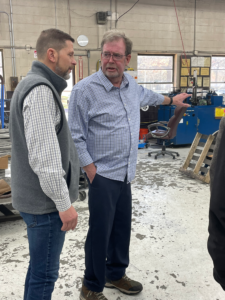Bristol Dignitaries Help Radcliff Wire Celebrate 65 Years

From left to right: Andrew LaForge – Membership Development Director, Central Connecticut Chambers of Commerce; Dawn Nielsen – City of Bristol Marketing & Public Relations Specialist; Jeanne Radcliff – CEO, Radcliff Wire; Jeff Caggiano – Mayor of Bristol; Charlie Radcliff – President, Radcliff Wire; Justin Malley – City of Bristol Economic & Community Development Executive Director; Susan Tyler – City Councilor
On Friday, March 8, 2024, Bristol Mayor Jeff Caggiano, City Councilor Susan Tyler, City of Bristol Economic & Community Development Executive Director Justin Malley and City of Bristol Marketing & Public Relations Specialist Dawn Nielsen and Central Connecticut Chambers of Commerce Membership Development Director Andrew LaForge helped celebrate Radcliff Wire’s 65th anniversary.
The mayor presented Radcliff Wire President Charlie Radcliff with a commemorative certificate after which Radcliff and his sister, Radcliff Wire CEO Jeanne Radcliff, shared an overview of the company and its history and provided a tour of the facility.”
“My father, Don Radcliff, started Radcliff Wire in 1959 to help spring manufacturers obtain special-shaped wire that wasn’t available anywhere else,” Radcliff said. The company still offers wire that’s difficult to find elsewhere, Radcliff said, citing the half-oval and crescent shaped mandrel wires the company currently manufactures for the medical industry, worldwide.
The group toured the factory’s annealing, drawing, shaping and rolling departments and was impressed with the vast array of shapes and alloys used in the wires the company produces, prompting Mayor Caggiano to ask, “Where does all the wire go?”
Radcliff replied, “When I was a kid working here, I never knew, which is why I decided to actively learn. Today, I still know less than 70% of the applications, because the wire is everywhere.”
Some of the more notable applications are in the industrial and aerospace industries. Industrial uses include wire that’s used to create Heli-Coils® and cable strain reliefs on robotic welding machines. Radcliff also produces special shaped wire used in the manufacture of small gas engines.
In aerospace, Radcliff’s special shaped wire locks rivets onto the skin of an aircraft. Also, special flat wire is formed to make clips that are used to attach fuel lines, and diamond shaped wires are used for Heli-Coil® replacement threads in engine assemblies.
The company also provides wire to the automotive and electronics industries, but it was the spring industry that gave the company most of its early business.

Mayor Jeff Caggiano and Charlie Radcliff discuss some of the applications for Radcliff’s specialty wire
“There’s a reason we’re here,” Radcliff said, noting that his father established the company in the heart of Connecticut’s spring industry to be close to his customers. The development of Connecticut’s spring industry, Jeanne Radcliff explained, was primarily driven by 19th century clock manufacturers.
In 1850 Connecticut clockmakers produced 511,000 clocks, with Bristol producing more than any other city in the state, making it the leading clock producer in the country. The presence of many small spring manufacturers in Central Connecticut today is the result of that phenomenon.
Radcliff Wire still provides wire for springs used in clocks and watches, but now their customers include manufacturers of smart phones, tablets, laptops, and microprocessor chips.
The massive volume of wire the company produces is manufactured by a relatively small team. Radcliff Wire employs just 29 people, and half of them have been with the company for 20 years or longer.
“We’re a family-owned business,” Radcliff explained, “and our employees become part of our family. They feel this, and they tend to stick around.”
Radcliff expects Radcliff Wire, like its employees, to be operating in Bristol well into the future. Mayor Caggiano said he’s “hoping for another 65 years for Radcliff Wire.”
If history is any indicator, he’ll get his wish.
Recent News
Free Programs Facilitate Funding for Manufacturers. Are You Missing Out?
Manufacturing companies in Connecticut have access to an impressive array of free resources designed to bolster their growth and improve Read More
Beryllium Copper: Wired for Defense
You don’t need a course in metallurgy to know that the addition of beryllium is what distinguishes beryllium copper wire Read More
The Wires Inside the Electric Vehicle Evolution
In the manufacture of electric vehicles (EVs), the choice of wire materials is instrumental in ensuring efficiency, safety, and performance. Read More
Triangle Shaped Wire: Some Food for Thought
It’s by design that some of America’s favorite foods, like pizza, nachos, and ice cream cones are served in Read More




